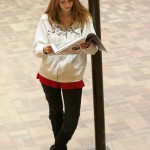
Stroking an object or “object caress” (context specific) can be a way to sooth a person when in public. In a courtship setting, an object caress spells interest.
Immediately upon leaving our homes, the place where we feel most comfortable, we begin to exhibit what is called “displacement behaviour”. Displacement behaviour is a coping mechanism that helps protect us emotionally from the outside world. The citizens of New York and other busy cities make for classic examples as they work their way through the city streets expressionless. The rest of the world sees these people as rude, despondent, miserable or unhappy but in actual fact it is completely normal and even constructive. Our public body language shifts subtly the moment we leave the door. Our faces show less emotion, it becomes more ‘pan faced’ as we if hiding our thoughts and inner feelings from others. City slickers immediately identify country folk. They make eye contact with strangers more often, and might even issue smiles, and nods at others, that is if they aren’t completely overtaken by fear and distraction. Making contact with others is normal for country folk. They come from an area where they know most of the inhabitants and therefore don’t fear public social interactions. Displacement behaviour is a stone-age protective mechanism. In our evolutionary past, had we encountered a group of strangers or a “city” of strangers, it would be in our best interest to internalize our fears and emotions so as not to betray our position. Our position is naturally fearful due in large part to being vastly outnumbered by what could be a potentially violent clan. We also wouldn’t want others to know that we carried valuable trade items, or were weak or scared. Therefore, our faces show a default position; no emotion.

Burying yourself in a book or listening to music through headphones are two great ways to retreat from the public eye so as to go unnoticed.
Displacement behaviours also show that we aren’t interested in interacting with others. You can test this for yourself by approaching people on the street looking for directions, for example. When you approach them it will take a second for them to snap out of their trance, if at all, before they notice that you are talking to them. They might even ask you to repeat what you have said because their mind had been “switched off”. Sometimes they even refuse to snap out of the trance at all and simply shake their head in a “no” type fashion from side to side, before continuing. We know people are in this type of trance because their body language become more self-focused. We pull our arms and legs inward, our face will become defocused, seemingly looking through people, and our body motions will become more minimal so as to avoid drawing attention to us. We may even become completely immobile and take on protective postures.

Nail biting is an oral fixation that replaces thumb sucking and allows the body to burn off nervous energy.
Another version of displacement behaviour happens when our minds are preoccupied with an emotion. When our home life begins to bother us when at work, our faces become emotionless as our minds drift to this more immanent problem. Our bodies display this detachment in various ways. For example, we begin to remove imaginary lint, play with a watch or pen, look away or become distracted, repetitive tapping of the fingers or foot, avoiding eye contact, rubbing the hands together, pinching an eyelid, smoothing clothing, rotating a wedding ring, nail-biting, or sucking a finger or pen. These all indicate a hidden thought linked to anxiety. The word displacement, in this fashion indicates that one is trying to avoid the task or issue at hand, and is instead, busy themselves with an activity that is much less taxing. Another form of displacement behaviours include sitting slumped over, with a glazed look endlessly staring at the floor or a spot on the wall.
Sometimes displacement behaviours are used to avoid conflict with others and those taking part would rather not be in the situation. To avoid conflict, they appear busy and preoccupied by doing other things. Displacement behaviours can also include gum chewing or nail biting, grooming, tapping, head scratching or playing with jewelry. It includes any behaviour that is out of place and serves the purpose of removing one’s self from the situation or topic at hand. We all understand when someone tries to “change the subject”, this is the same thing, only it is accomplished silently.
